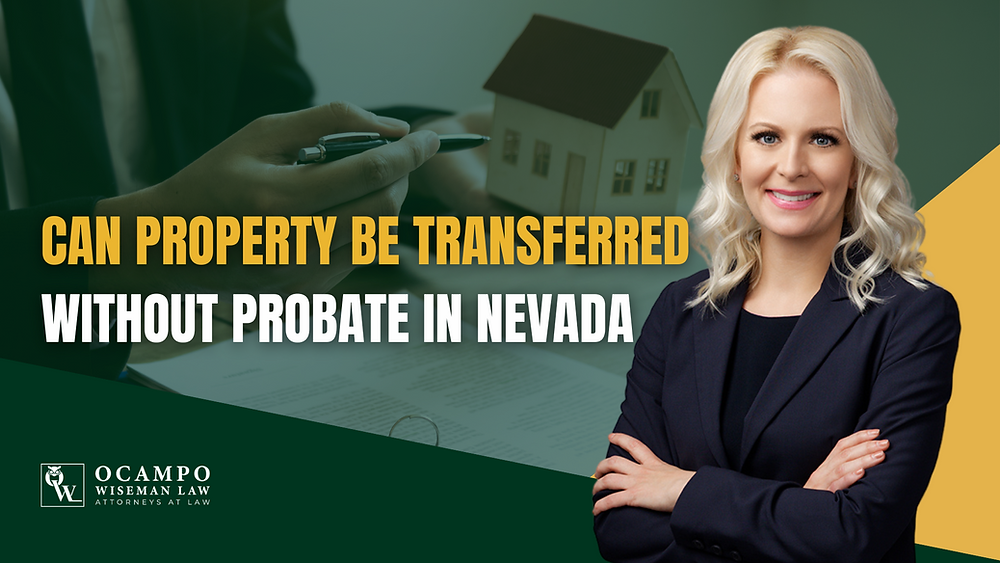Nevada Probate Without a Will: What You Need to Know
Sarah Ocampo
Many people assume probate only happens when there’s a will. But in Nevada, that’s not true. If someone dies without a will (also known as dying intestate), their estate still goes through probate, and the process can be even more complicated.
Instead of following the deceased's wishes, Nevada’s intestate succession laws determine who inherits, which may not align with what the person would have wanted. A court-appointed administrator is responsible for managing the estate, notifying creditors, and distributing assets to the legal heirs.
If you're facing this situation, or want to avoid it through proactive planning, working with a probate attorney can protect your family’s interests and simplify a complex legal process.
Understanding Probate in Nevada When There's No Will
When someone passes away without a will in Nevada, their estate is considered "intestate." This doesn't mean probate can be avoided.
On the contrary, intestate estates typically require court intervention to determine the rightful heirs and distribute assets according to Nevada state law.
The probate process serves several essential functions, even without a will:
1. It provides a legal framework for identifying and valuing the deceased's assets
2. It creates a process for paying outstanding debts and taxes
3. It establishes a clear method for distributing remaining assets to legal heirs
4. It offers a court-supervised process that helps prevent disputes among potential beneficiaries
Why Legal Assistance Becomes Even More Critical
Without a will providing clear instructions, the distribution of assets follows Nevada's intestacy laws. These statutory formulas determine who inherits based on family relationships, which may not align with what the deceased would have wanted.
A probate attorney brings significant value in these situations by:
Navigating Complex Legal Requirements
The probate process involves numerous filing deadlines, court appearances, and legal documents. Without proper guidance, personal representatives risk making costly mistakes that could delay the process or create personal liability.
Determining the Correct Intestate Succession
Nevada law establishes a specific hierarchy of heirs when there's no will. A probate attorney helps identify all potential heirs and ensures assets are distributed according to law, which can be particularly complicated in blended families or when distant relatives may have inheritance rights.
Managing Creditor Claims
The deceased's estate must address outstanding debts before distributing assets to heirs. A probate attorney helps personal representatives properly notify creditors, evaluate claims, and protect the estate from improper demands.
Resolving Disputes Efficiently
When no will exists to provide clear direction, disagreements among family members about asset distribution are common. Legal counsel can mediate these conflicts and represent the estate's interests if litigation becomes necessary.
Real-World Example: Probate Without a Will in Nevada
Consider a common situation in Las Vegas: A homeowner passes away without a will, leaving behind a house, retirement accounts, and personal property. Without legal guidance, the family might incorrectly assume they can simply transfer the house's title to a surviving spouse or divide assets among children without court involvement.
In reality, even with seemingly straightforward assets, Nevada law requires probate administration. The court must appoint an administrator (typically a close family member), who then becomes responsible for the entire probate process, from inventorying assets to final distribution.
Without professional legal assistance, this administrator risks:
- Missing critical deadlines for estate inventory
- Improperly handling creditor notifications
- Incorrectly distributing assets among legal heirs
- Becoming personally liable for mistakes in the administration process
When Probate Might Be Avoided
While probate is typically necessary with or without a will, there are some estate planning structures that can help avoid court proceedings entirely. The most common alternative is a revocable living trust.
Unlike wills, properly funded trusts don't require probate because the trust already owns the assets, and the successor trustee can manage and distribute them according to the trust terms without court supervision.
Other non-probate transfers may include:
- Accounts with designated beneficiaries (retirement accounts, life insurance)
- Property held in joint tenancy with right of survivorship
- Payable-on-death accounts
- Transfer-on-death deeds for real property
Steps to Take When Facing Probate Without a Will
If you're dealing with an estate where no will exists, consider these practical steps:
1. Secure the Deceased's Property
Protect assets from theft or damage while determining the proper legal process.
2. Gather Important Documents
Collect information about assets, debts, financial accounts, property deeds, and potential heirs.
3. Consult with a Probate Attorney
Schedule a consultation with an experienced Nevada probate lawyer who can evaluate the specific circumstances and recommend the appropriate legal process.
4. File a Petition for Administration
Initiating probate requires filing formal paperwork with the appropriate Nevada court, typically in the county where the deceased lived.
5. Follow Court Procedures Carefully
After appointment, the administrator must follow specific legal requirements for notifying creditors, inventorying assets, paying debts, and distributing remaining property.
Considering Your Own Estate Plan
While understanding the probate process without a will is important, this situation highlights the value of proactive estate planning. Creating a comprehensive estate plan, whether through a will, trust, or combination of tools, provides several benefits:
- Ensures assets are distributed according to your wishes
- Names guardians for minor children
- Potentially avoids or simplifies the probate process
- Reduces the emotional and financial burden on loved ones
- Minimizes potential disputes among family members
Conclusion
Contrary to common belief, the absence of a will does not eliminate the need for probate proceedings in Nevada. In fact, dying "intestate" often makes the process more complicated for families during an already difficult time.
Professional legal guidance becomes even more valuable when navigating probate without clear written instructions from the deceased. An experienced probate attorney helps ensure the process follows Nevada law while protecting the interests of the estate and its beneficiaries.
If you're facing the probate process without a will, consider scheduling a consultation with a Nevada estate planning and probate attorney. Many offer complimentary initial consultations to assess your situation and provide guidance on the next steps. This small investment in professional advice can save significant time, money, and stress throughout the probate process.
FREQUENTLY ASKED QUESTIONS
Is probate always required if there’s no will in Nevada?
Who inherits if someone dies without a will in Nevada?
Can I be held personally liable if I handle probate without legal help?
What steps should I take if my loved one died without a will in Nevada?
- Secure any property and financial records
- Identify potential heirs
- Consult a probate attorney to determine your next steps
- File a Petition for Administration in court to begin probate proceedings




